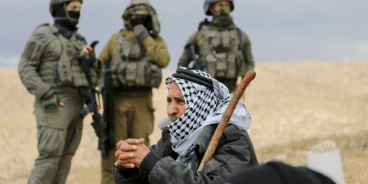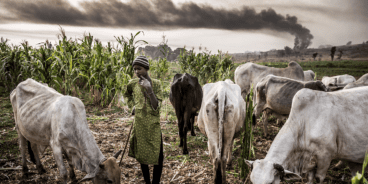
Atrocity Alert No. 136: Democratic Republic of the Congo, Yemen and Nigeria
Atrocity Alert is a weekly publication by the Global Centre for the Responsibility to Protect highlighting situations where populations are at risk of, or are enduring, mass atrocity crimes.
Risk of violence ahead of Presidential Elections in DRC
The Democratic Republic of the Congo (DRC) is expected to hold long-delayed presidential elections this Sunday, 23 December. Originally scheduled for December 2016, the elections will determine who will replace President Joseph Kabila after nearly two decades in power. However, two years of unconstitutional delays in holding the vote have resulted in deep political divisions throughout the DRC, and the country is at risk of increased violence if the conduct of the elections is not perceived to be free and fair.
Security forces in the DRC have a history of using disproportionate and deadly force against opposition supporters, and since September 2016 at least 100 people have been killed and hundreds arbitrarily detained during election-related protests. On 11 December three people were killed when police fired live ammunition and teargas during a rally for opposition candidate Martin Fayulu in Lubumbashi, Haut-Katanga province. The following day police reportedly blocked Fayulu’s convoy while it was in transit to a rally in Kalemie, Tanganyika province, and attacked his supporters. On 13 December soldiers prevented supporters from greeting another opposition candidate, Felix Tshisekedi, in Mbuji Mayi, Kasai Orientale province.
The elections face a number of other challenges, including allegations that some politicians have utilized hate speech during campaigning, as well as a 14 December fire in an electoral commission (CENI) building that destroyed 70 percent of the voting equipment for the capital, Kinshasa. According to the head of the CENI, machines from other parts of the DRC will be rerouted to Kinshasa to ensure the election can take place. An estimated 40 million people are expected to vote across the country.
Meanwhile, militia violence continues to plague eastern DRC. According to the UN Refugee Agency, at least 1.5 million people have been forced to flee their homes this year as a result of clashes between armed groups and government forces. Over the past three months the UN has also documented more than 1,300 cases of human rights violations perpetrated against civilians in Beni, North Kivu province, including killings and kidnappings.
The UN High Commissioner for Human Rights, Michelle Bachelet, and the head of the UN mission in the DRC, Leila Zerrougui, have condemned pre-election violence and called upon the government to ensure that the right to freedom of expression and peaceful assembly is upheld. The security forces must refrain from using disproportionate force against civilians, and all sides should work to ensure DRC’s historic election provides an opportunity for the country’s first peaceful transition of power since independence in 1960.
UN Security Council to vote as Yemen continues “descent toward famine”
On Thursday, 13 December, the first consultations in over two years between parties to the conflict in Yemen resulted in a significant diplomatic breakthrough. During the negotiations, held in Sweden and led by UN Special Envoy Martin Griffiths, representatives of the government of Yemen and Houthi rebel forces agreed to a ceasefire across Hodeidah Governorate and prisoner exchange, and also signed a statement of understanding on the city of Taiz.
The conflict in Yemen has resulted in the deaths of at least 16,000 civilians since March 2015 and is the worst humanitarian crisis in the world. Houthi and government-allied forces – including the Saudi Arabia and United Arab Emirates-led coalition – have targeted civilian infrastructure, including schools and hospitals, and deliberately obstructed the delivery of humanitarian aid. In December an analysis by the Integrated Phase Classification (IPC), an international tool for measuring food security, determined that 15.9 million people – over 50 percent of Yemen’s population – are severely food insecure. For the first time over 60,000 Yemenis were also classified as IPC Phase 5, or “catastrophe” level. As UN Under-Secretary-General for Humanitarian Affairs Mark Lowcock told the UN Security Council (UNSC) on 14 December, “the results decisively confirm Yemen’s descent toward famine.”
The UNSC should seize the opportunity provided by the Stockholm Agreement to confront Yemen’s impending famine and adopt its first resolution on Yemen’s civil war in over three and a half years.
In addition to endorsing the agreements reached last week, a new UNSC resolution should reaffirm that all parties to the conflict in Yemen must uphold their responsibility to protect civilians from war crimes and crimes against humanity. The Council should emphasize, in particular, the obligation to distinguish between civilian populations and combatants, as well as the prohibition against indiscriminate attacks and attacks against civilian infrastructure. Finally, the UNSC should stress the need to end impunity for all violations of International Humanitarian and Human Rights Law, and reaffirm that those responsible must be held accountable, regardless of their position or affiliation.
Investigation says Nigerian security forces massacred civilians
On Monday, 17 December, a New York Times investigation reported that members of the Nigerian security forces were not acting in self-defense when they used deadly force against civilian protesters belonging to the Islamic Movement in Nigeria (IMN) during October. The Nigerian army had previously claimed that its forces intervened only after protesters blocked traffic and started throwing rocks. However, video evidence and witness interviews demonstrate that security forces indiscriminately fired live ammunition into the crowd and continued to use deadly force even as people fled. At least 24 IMN members were killed during the 29 October incident.
The killings took place within the context of wider violence against the IMN, a Shia political group with a history of conflict with Nigeria’s federal state. Shias make up approximately three percent of the population of Nigeria.
The IMN had organized a three-day religious procession from Suleja to Abuja, Nigeria’s national capital, between 27-30 October. On 27 October security forces killed six people when they opened fire on a gathering of IMN members at a bus terminal. A further 24 people were killed on 29 October on the outskirts of Abuja, and on 30 October the Nigerian police used teargas and live ammunition, and arrested 400 IMN members to prevent them from entering Abuja city. In 2015 soldiers also killed more than 340 IMN members following a violent confrontation in Kaduna State.
The Nigerian government is currently dealing with multiple security threats that continue to place civilians at risk of mass atrocity crimes. On 17 December Amnesty International reported that the Nigerian government’s failure to comprehensively address endemic violence between semi-nomadic herders and settled farming communities has resulted in at least 3,641 people being killed since January 2016. Approximately 57 percent of these deaths occurred during 2018. The Nigerian army rejected these findings and called for Amnesty International to be banned.
In keeping with previous promises, the Nigerian government should intensify efforts to reform the security sector and bolster the rule of law. The government should fully investigate all alleged extrajudicial killings and hold the perpetrators accountable. The government should also incorporate International Human Rights and Humanitarian Law into all military and police training.
Related Publications


Atrocity Alert No. 444: Nigeria, Haiti and South Sudan
